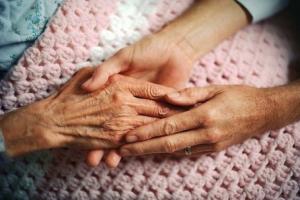# Generous Tuesday - the opportunity to do something significant for different people. Fortunately, lately there are more and more people who are ready to help not only children, but also older people.
We have developed special instructions on how to help single elderly people with the greatest benefit for them.
Why do you need help?
Helping the elderly is not the most popular sphere of charity, often they start thinking about them mainly on May 9 and the New Year. People bring or give gifts and again forget about the old people. But the main contradiction is that even with material difficulties, grandparents need not gifts and things, but constant attention and participation.
In particular, help is needed for lonely elderly people with limited mobility and those who live in nursing homes.
Help in nursing homes
Nursing homes are an inevitable phenomenon: someone left without relatives, is weak and unable to serve themselves, some have relatives left for another city, others have relatives, but there is not enough living space and the opportunity to care for older people. What is life in a public institution at the expense of the state? This is a roof over your head, breakfast-lunch-dinner and someone else's bathrobe after common washing.
Old people living in boarding houses do not just remain overboard, they cease to exist for the outside world. They live somewhere there, often forgotten, lonely and completely devoid of attention. In total, there are more than 2,000 nursing homes and institutions in Russia, where more than 10,000 single elderly people live.
The main problems of an elderly person in a nursing home are loneliness, lack of personal space and absolute free time, which has nothing to occupy. Walkers have the opportunity to go into the lobby to the TV or to the store, walk around the territory. The bedridden people are forced to lie down and, with any luck, listen to the radio or television - whoever has them in the room. They are visited only by a nurse who brings food and most often silently and hastily feeds from a spoon, because she has another 30 people in line.
Of course, hobbies and hobbies are not prohibited in the nursing home, and real craftsmen are found among grandparents. But who, for example, will buy yarn for grandmother? And what if 75% of her pension goes to a boarding school, and for the rest I want to get a tasty one. Or this surplus of money can even be given to the nurse - for additional services, such as an extra diaper change or a trip to the store.
Helping older people at home
Many older people living at home also need help - with housework, medical care, etc. They need attention and communication. But in this case, a number of difficulties arise. The first is to find contacts and establish access to the apartment. No personal data law service ever gives the addresses and phone numbers of older people.
If you nevertheless managed to get to know your grandfather or grandmother and begin to help, then the family may be wary and distrustful of a person who for some reason began to come to their elderly relative. Unfortunately, these fears are far from always in vain, especially with the widespread use of fraudulent schemes.
In addition, it may seem to an elderly person that after the visit of the volunteer in the house, something disappeared, and then the volunteer may have problems - he is in no way protected from such situations. During a visit, an elderly person may become ill. That is, the volunteer must be prepared for many situations.
Thus, when it comes to a person living at home, it is very difficult to organize permanent assistance, it requires training a volunteer, contacting social services (most elderly people living at home receive social worker services if necessary), regulating the relationship “volunteer - ward” contract. Of course, this can only be done by an organization with work experience. For example, a network for assisting older people is developed in the Red Cross organization.
What is needed first?
- The elderly care about personal attention, care and respect, creative employment
One of the biggest problems of the elderly in nursing homes is apathy and indifference to the surrounding reality, up to “loss of personality”, when older people answer “what they say, we will do it” and calmly perceive the absence of locks on the doors, rude treatment and poor material conditions.
For staff, people who have to be cleaned every day, who, moreover, have their own “nonsense” and whims, also lose their individuality, and, coupled with fatigue, sometimes cause neglect. According to the state, the boarding school can have 2-3 nurses for 50 bedridden people, and the staff physically lacks the strength to communicate and attention. So it turns out that a person has no personal space, he is dependent, and no one is interested in his needs.
Older people often go inside and soon enough lose their motivation to do anything at all. To avoid this and return to them an interest in life and a sense of being personalities, communication, comfortable conditions, and proper care are necessary. Therefore, it is so important to communicate with grandparents, to give them the opportunity to feel respect for themselves.
It is especially important to give those living in a boarding school the opportunity for creativity and self-expression, to make their brain work, because after so many years of forced idleness, the old people are weaned from the need to think and do something. For example, the Old Age in Joy Foundation employs cult cults and art therapists to work with older people who first resist, and then begin to enthusiastically create, prepare for new classes and present their works at exhibitions.
Older people living on their own also need to communicate and be creative. Charities that help them engage them in various creative and intellectual activities.
- Material and domestic problems
The conditions in which people live in boarding schools are far from comfortable. Many nursing homes, especially in the regions, are often almost in disrepair. The interior of the institutions is very far from our ideas about comfort - breech walls painted with paint, unrepaired bathrooms, an overgrown courtyard, as well as 3-4 more roommates. Therefore, any grains of attention and care for these people are real joy and happiness. Older people living independently, especially in small towns or rural areas, have material and domestic problems that can be helped to solve. For example, often older people need help in meeting their daily needs - to clean the yard, bring water, clean up the apartment / house.
How can one help?
To help you effectively, without harming or finding difficulties and problems, you need to join experienced organizations or groups. Or start helping a well-known person, a neighbor.
You can:
1. Regularly, and not just on holidays, pay attention and help some elderly person.
- Go visit grandparents in a nursing home. Every weekend, you can join a volunteer trip, take part in a concert, sing songs, bring sweet gifts and cheer up grandparents.
- Become a "correspondence grandson." Indeed, many old people are lonely, and postcards and letters become real strings connecting completely strangers from different parts of the world.
2. Help with the purchase of basic necessities (food, medicine, care products for bedridden people) or help with house cleaning, cooking, etc.
- To purchase the necessary things that volunteers can take to boarding houses or transfer to those in need:
- for boarding houses: diapers, personal care items, rehabilitation tools, etc.), medical equipment;
- for residents living at home, a list is formed in each specific situation upon request. - Go to a distant village, bring food to lonely old people, raise funds and buy firewood for the winter.
- Send a food package to the poor old people living in the village, because in the regions the pension is sometimes minimal, and lonely grandparents living in their homes are sometimes beyond poverty. For example, the community http://together.ru/ offers a variety of initiatives for those who want to targetedly help older people. This includes the collection of food parcels, home repair and cleaning, etc. These initiatives work on demand, word of mouth, or in collaboration with social protection agencies.
- You can join the “Give firewood” promotion
It seems that for a long time already, with any misfortune, a person has learned to live side by side - people know how to smile even in the most difficult times. And with all his strength, endurance and patience, it’s hard for him to get along with one thing - loneliness.
Moreover, this disaster beats the most vulnerable for the most defenseless: children and the elderly. And if the children have hope for a bright future surrounded by the family, then the old people sometimes have an unenviable dowry from fate - memories. If we, among the many names in the phone book, can still afford to lazily choose a company for the evening. That they, in their "for 80" have to open the yellowed pages of the phone book only to cross out the next name of the departed comrade.
It seems that everything has already been lived through: all theaters, concerts, fun companies, trips to potatoes and trips to the sanatorium have remained in the blurred past, somewhere behind the train in which you are racing at a furious speed in an unknown direction to where no one has returned . Well, if there is a family, relatives near, do not forget.

“Do not forget” - this is the main desire of the elderly, they so do not want to be forgotten. And, after all, this sometimes requires a little: one call, one hello, one letter, a couple of apples, cookies, a living flower in a pot or two balls of thread so that grandmother knits her socks and sees in this the meaning of her present life. That life when insomnia more often comes to visit instead of friends; when you know what war is, but don’t know what an iPhone is; when you lose count in your illnesses and don’t know whether you will see the next spring.
And if there are no relatives left? If they don’t have time for old-fashioned quirks and sighs, if old age is a burden and a bag of problems for them? Nursing homes hide behind their walls hundreds of such forgotten old people who are ordered to live out their lives where they are “best taken care of”. For some, this was decided by their relatives, for the second - life itself, still others decided on their last move on their own. Despite all this, the elderly do not need much. Even ordinary letters can brighten up loneliness, but who is writing letters now? A long-forgotten genre - to give pleasant emotions in a mail envelope.

2. Open a photo album and find grandparents who are not yet written;
3. Leave a comment on the photo of grandparents with whom we would like to correspond;
4. Wait for a response from the fund coordinator, who will send you an address.
5. And most importantly - write at least 1 time per month.
You can write to grandparents about anything: who you are, how you live, what you do, what you read recently and what kind of dog you have.
P.S. Be sure to include your photo in the first letter. Experience shows that the photos of "grandchildren" by correspondence between grandparents and reverently store on their bedside tables.
Start small
If you feel that you are not yet ready to decide on a permanent correspondence, you can start contact with greeting cards. New Year is a wonderful occasion!
Congratulation on the holiday does not entail the obligation to continue correspondence, but it will be pleasant for them to re-read good wishes from completely strangers. Postcards should be sent by Russian Post about 7-10 days before the significant date. And to take part in the program you need to contact the fund coordinator or leave a request on the site.

For several years now, the volunteer group “Old Age in Joy” has been traveling to nursing homes and brightening up the loneliness of their inhabitants. Female students sing songs and inflate balloons, blow soap bubbles, give out sweets and bring scarce diapers, and in between trips they write letters to completely strangers with whom they have become the closest and kin. The ideological inspirer of this group is Elizaveta Oleskina, a student at the philological department of Moscow State University. She does not consider it something special to give warmth to grandparents and, in principle, does not use the word "old people".
“Tell me, Elizabeth, how did it all begin?”
- When I entered Moscow State University, there was a desire to help someone. I knew that many help children, but I have not heard that someone helped single elderly people. Then, in my first year, I came to the university student union to find out if they help grandparents; they said that for the first time they heard about this, but if I do something, they are ready to help. Together with them we held concerts in Moscow nursing homes. I have many friends musicians and those who dance. We arranged concerts on March 8, Victory Day, other holidays. In these nursing homes, everything is fine and beautiful. Grandparents rejoiced at our performances, clapped, and we were pleased.
After the first year, as a student of the Faculty of Philology, I was in folklore practice in the Pskov Region, in the Gdovsk District. One of our facilities was a nursing home in the village of Yamm. It was not at all as good as in Moscow boarding schools: very poor, there was a bad smell. I was struck by the appearance of very thin grandparents. We could not collect the folklore, but we made friends with the inhabitants of this house, and when we left, we were asked to return as soon as possible, just to communicate with them.
After this trip, we visited Moscow nursing homes for another year, and then decided to see what was happening in the suburbs. We wanted to know, is it as good there as in Moscow? Our first address was a nursing home in Ramenskoye, where, incidentally, there are also good conditions of detention. We arranged a small concert, but not all the residents of the nursing home attended it - they explained to us that preparations were underway for the celebration of May 9th. But when asked how the celebration will be held, what program will be on this day, they heard the answer that no program is provided, because the staff this day is a day off. It seemed to us wrong. I wrote in my LJ diary that it would be nice to get together everyone who can and arrange a holiday for grandparents.
On the morning of May 9, 2007, 30 people gathered at the Komsomolskaya metro station who had not seen each other before. Everyone brought sweets, flowers, some gifts, and we went to Ramenskoye. This was probably our best Victory Day.
Then people from this group began to travel to Ramenskoye every two weeks. So the backbone of our team gradually formed. I told them that far, far, in the Pskov backwoods, they are waiting for us. And she complained that few could go to them. The guys said they could, bought tickets and went to Yamm.
During the time we were away, the conditions of detention changed a little for the better, but grandparents still remained as lonely and sad, deserted and abandoned. Then we came to them again two months later and brought in a large plasma TV, which they were very happy about, because the main activity of grandparents was to watch television, and if it is small, black and white and “snowing”, then the situation is very sad. The Board of Trustees in the name of St. Alexy, Metropolitan of Moscow, helped us buy a TV. Thank you very much for this. After Yamma, we drove into the neighboring nursing home in Chernevo - it was heaven and earth in comparison with Yamm. Chernevo is very beautiful, neat, grandparents are relatively healthy. In the two years that we went there, only two people died there, and in Yamma - eleven.
And we write letters to all the inhabitants of the nursing homes we visited.
- What is your group today?
- Today we are already quite a lot. On our site "Old Age in Joy" registered more than two thousand people. More than a thousand people write letters to their “sponsored” grandparents. More than 500 people constantly help with things, money, some kind of gifts. In each trip we travel in groups of six to ten people. Those who travel, about 40 people.
– And who do you have more - boys or girls?
- In the group that goes to nursing homes, there are only two young men.
- Why is that?
- I think that this is from a different perception of reality. In our trips, we see the joy that we bring to grandparents, and men - difficult situations that they cannot fix. Loneliness and abandonment weigh heavily on their psyche. But, nevertheless, they are always ready to help with the car, to bring gifts, things. In general, it seems to me that affairs of such a plan as ours are more characteristic of women.
- And what is the social composition of your movement?
- Actively traveling are mainly students, and the rest are people from 20 to 40 years old who have received education and work.
“How is your visit to a nursing home usually going?”
- If this is a one-day visit without an overnight stay, then we are going to the station or driving two cars. We bring sweets, gifts. Arriving, we usually gather in some convenient place for communication, sing songs with a guitar or accordion, and grandparents sing along to us. We arrange various contests like “Guess the melody” or “Blow the biggest soap bubble”, come up with some kind of lottery, play balloons, and give gifts at the end of the general fun. Then we go to chat around the rooms, be sure to go to bedridden; if they want, we sing and dance separately for them, try to entertain. We communicate, we are interested in whether everyone receives letters, if there are any needs.
- What are nursing homes today?
- Thank God, nursing homes today are well funded, and there are pretty decent conditions. If somewhere unexpectedly and stumble upon poverty, then this is usually the fault of the leadership.
We go not only to nursing homes. Grandparents spend many years in hospitals, but not because they are being treated, but because they live there. These are the so-called nursing care chambers, where there are those who did not get into nursing homes, which are crowded today - there are lines. In these hospitals, grandparents live an average of seven years, and these places are very poor compared to nursing homes. There you can observe a shortage of everything: from cleaning products, buckets and mops to mattresses and beds.
- How do nursing home administrations feel about your visits?
“In principle, they understand that we don’t have any personal benefit for ourselves from these trips, and grandparents have more fun.” We have a normal relationship. They understand that if they need something, for example, there are not enough diapers, then we can help.
The director of one of the nursing homes we care for has graduated from a music school, and many of her grandmothers are singing, and it’s problematic to bring a piano there — it's a three and a half hour drive from Veliky Novgorod. We searched people, found a used synthesizer for them. Now they sing there.
We worship people who work in nursing homes. For the salary they receive, they often do more than possible. In most cases, very good people work in such places, who understand that it is better to be merciful and give oneself completely to work than to live with remorse. In many nursing homes, employees and residents live in virtually the same family. There are so many good nurses and nannies. Of course, there are exceptions. But, thank God that these are just exceptions.
- How was the idea born of writing letters to the elderly?
- We initially understood that grandparents miss us, news from the outside world. We cannot come to distant nursing homes every two weeks, and we really did not want to part with people. And we knew that letters were written to children in orphanages. We decided, what is worse than grandparents? Then it turned out that this generally simple idea was liked by many, our grandparents began to have grandchildren by correspondence. Today, many receive letters not only from Moscow. But also from America, China, Finland, Belgium. Everywhere there live people who want to have a correspondence grandmother.
- What do they usually write in nursing homes?
- We do not have any template. We ask people who enter into such correspondence to tell about themselves, about their lives and friends, about why they wrote specifically to this grandmother, to ask the grandmother about her life. At the same time, we all warn that there is no need to wait for an answer. Well, if the grandmother writes, but there are times when a person may be illiterate or his hands do not work, his eyesight is poor. That is, there are situations when a person cannot physically respond to a letter, but at the same time rejoices in every news.
“Do you have occasions when people write to the elderly and then drop out, forgetting that“ we are responsible for those we tame ”?
- Unfortunately, they do. But we warn people in advance that if they are not ready to continue correspondence, then we must inform our coordinator. We have three coordinating girls from different areas, they send “reminders” to all their grandchildren by correspondence once a month, asking them how they are communicating, reminding them of the upcoming birthdays of their grandparents, and reporting our various news and events. If the grandson does not respond to the “reminder” by correspondence, he will be sent again; if she doesn’t answer her, then another grandson is sought. But such cases are very rare.
- Where did you get the desire to help the elderly?
- I do not know. It seems to me that every person is pleased to be useful to someone. I think this is a universal trait. It's boring to live if you just feed and drink yourself. It’s great to be useful and give joy to people simply because you are, and not because you are rich and successful.
- Do you remember by the name of all the old people with whom you communicate?
- Unfortunately not. I remember everyone by sight, but I remember names badly. I’m glad to see everyone, I miss many, but I don’t remember everyone by name. But our correspondence coordinators who “distribute” grandmothers to their grandchildren remember everyone.
“How many nursing homes do you care for?”
- In 30 nursing homes we write letters, in 25 we go.
We have a nursing home - this is in the Urals - which "he found us." From there, a social worker wrote, who found out about us, and said that they have grandmothers who want to receive letters. She sent us their photos and coordinates by e-mail, and we mostly write to them, since it takes a long time to go there. This was the first activity of a nursing home. If such cases still exist, then we will write at least to the North Caucasus, at least to Kamchatka.
- How do you determine the order of visits to nursing homes?
- This happens somehow by itself, chaotically. We go to the Pskov region because of Yamma, which we remember. Choose something from the directories. Once I liked the name of the settlement in the Novgorod region - Pes. We thought that a place with that name is not often visited and we will be very happy. When we arrived there, we thought it was logical to drop into those nursing homes that are located nearby. They visited Novgorod, why not go to the Nizhny Novgorod region? So gradually we “grew up” with houses. Friends from Bryansk said they could go to nursing homes in their area. Very close to Moscow is the Tver and Tula regions, where to go for two to three hours.
We coordinate trips to destinations.
Today we already understand that we have so many nursing homes and new ones, it will be difficult for us to patronize. But we would very much like to connect volunteers on the ground. We have been doing this for over a year now. Because it’s absurd to go to Nizhny Novgorod Region for nine hours to talk there for two hours and go home. This could be done by local people. But while we are probably looking badly, or those who want to hear us poorly. But at the same time, if, for example, in Samara there are four to five people who want to be volunteers and ask them to teach, we will definitely go there, show how we work, and we will help them in every way.
- How has your life changed since you started visiting residents of nursing homes?
- It was so long ago that I don’t remember life “before”. In many ways, for me this is the main meaning of life - not only to help and be useful, but also to find a huge number of responsive people who become my best friends. During this time, the scope of my communication expanded several times, the country looked decent.
- How do your old friends feel about your volunteering?
- Fine. Of course, now I give them a little less time than before, but most of them support me. A lot of people come with me.
- And how do your relatives and grandparents perceive your trips?
- They do not understand a bit why go to others if they have their own. But knowing that the situation of those to whom we go is much worse than them, they say that I am doing the right thing. I come to my family and grandparents, so everything is fine.
- Is it hard to be a volunteer?
- Of course not. This is a voluntary affair. Given that in nursing homes they take care of grandparents (in one, even the administration provided everyone with mobile phones), it is not morally difficult. It happens that somewhere the conditions are worse, but there is no complete horror.
Another thing is that you can think and worry about the fate of every person who got there. But, in my opinion, this is pointless; it’s much better to dispel the longing of these people, distract them, tell them that they are not alone and that you need them.
To be a volunteer, no extraordinary abilities are required. You need to have a desire to talk with grandmothers, smile at them. You will not see any horrors in nursing homes. There are just elderly people who live together, but at the same time they are very lonely.
- Often have to deal with misunderstanding?
- Not. Probably because those who do not understand us “do” it quietly, on the sidelines. It is unlikely that someone in response to our calls to send things and sweets for grandparents will write that he does not support us. Those who do not understand us, either do not notice us, or do not attach importance to us.
- When you first went to a nursing home, thought that it would result in such a large-scale project?
- I can’t say that we have some kind of large-scale project. We did not cover all nursing homes. When we write letters to all nursing homes, and not at 30, then we can talk about this.
“Do you want to write letters to all nursing homes?”
- If we have enough volunteers, then yes.
“And do you have such a global goal?”
- Not. We just do what we have enough energy and time for. And we are trying to attract local volunteers to help us. I think that if more people became interested in what we are doing, it would be great. And it would be easier for us. We would go slowly to our close grandparents. And we can find many grandchildren by correspondence.
We did not set any goals and do not set what will turn out, and it will turn out.
- And in the regions you are not reproached for the fact that you have nothing to do, that you are "mad with fat" and so on?
- No, people understand that in Moscow the situation is much better with the content, and not so boring. And in the regional and rural nursing homes just do not have enough entertaining and leisure assistance. Therefore, we drive the night to Nizhny Novgorod, from there two or three hours by bus to the local wilderness, so that when we arrive at the place, we will spend only two or three hours with grandparents. The trouble is that for Nizhny Novgorod such places are also wilderness, they perceive villages as a hole, where they only go for three hours. And reluctantly go there.
- Where do you get the money for tickets, gifts?
- We pay for tickets ourselves, a lot of things are brought in response to our requests. We often buy sweets or donate money to it. We try to buy the same for everyone, so as not to be offensive. For some large things: medical beds, wheelchairs - we collect money purposefully. We transfer such things according to the act of acceptance and transfer, we report to the donors.
Unfortunately, we do not cooperate with any official organizations. And we would also like for some successful confectionery company to give us substandard products that are not for sale, but quite edible. We phoned many of these companies, but so far to no avail. It’s sad, but we do not lose hope.
- What kind of communication do the elderly lack most?
- Any communication with the outside world. They rejoice at people who will listen to them and tell about themselves. After all, they “cook” in their closed world, and when some new person gets there, they have something to talk about, what to discuss, what to talk about. If we come with ten of us, and there is one young man among us, then the grandmothers begin to marry him at once in turn, to find out who among us is his sweetheart. You look, and their look is more cheerful.
- What does your group need most?
“We need a lot of things.” But most of all, we need local volunteers.
Our standard set for the trip is 30 sets of sweets, balloons, soap bubbles and a man with a guitar. For money it’s not much, but you can’t imagine how much joy! After all, they forgot when they started blowing soap bubbles, throwing balls.
I want not only we to do this, but people all over our vast country. Here, in St. Petersburg, we opened a branch. Now the St. Petersburg guys go to two hospitals, eyeing the third. They need different things for grandparents. The first time we went to them and visited together. Now they themselves have turned around with might and main. This is our great joy and pride.
We hope that not only Peter, but any other city can.
The help of volunteers is also needed in Moscow, because we not only visit grandparents in the city and the Moscow Region, but also go to neighboring regions. People are often not enough. In the same Tver region, we visit three hospitals and a nursing home, and there are still places nearby where you can come and where we would be glad.
We always have a great need for diapers. They are not allocated much in nursing homes, but they are not seen at all in hospitals, and they really need them. Very often we need medical beds, anti-decubitus mattresses and covers. You need to collect money for this.
We are not a state or religious organization. We are just a volunteer group. We do not say that we are all Orthodox. We are glad to all the people who want to help grandparents together with us.
We are not engaged in human rights activities and will not. It is enough for us to give joy on weekends and walk after that the rest of the day happy. Let the state solve problems of a state scale.
- What is the difference between compassion and mercy for you?
- I did not think about it. Charity is some kind of active action, and compassion is when you empathize with someone in the soul, but do not show it. Maybe so. It is necessary to look in the dictionary.
“Why are you visiting lonely old people?” In order to “be happy for the rest of the day” or to have more warmth in the world?
- Probably, after all, I am more guided by selfish considerations, for myself. It gives me great joy. We sing, and grandparents also rejoice, smile, change, penetrate our disposition, and then they wait for us very much. It gives me a lot. The realization that so many people love you for no reason, but simply because you visit them, that they are waiting for you, that you are welcome, is pleasant and very inspiring.
Well, the best friends, the best people that I come across are in this disinterested sphere, they just want to help and do not require anything in return. It is happiness to see their smile and joy.
Igor Ilyin talked with Elizabeth Oleskina
|
Dear, beloved, dear grandparents!
Hello! My name is Galina, I am a student of secondary school No. 73, Krasnodar.
I would like to thank you for what you are. For your love, for affection, for the fact that in difficult times you helped us. For good advice. You are so kind to us, but we did not notice it. It is a pity that we all understand this too late. Many do not value what we have - you, dear and wise grandparents. You often scolded us for disobedience. They rejoiced with us for the small victories. Sometimes we get mad at you because of our problems. And sometimes they upset you. But you were always there to console in difficult times, to support. Now most people underestimate the older generation. For example, I respect and am proud that I have such a rich pedigree - grandparents. Do people really not understand that they are losing such living wealth - you? After all, you can neither sell nor buy the wealth and wisdom that appears over the years. We always come back to you for advice. You always know what we want or do not want. You are the wisest and most respected generation.
How are you now? How are you? I hope you live not bad.
I wonder what would happen if not for you? After all, you stood on the line of defense during the Great Patriotic War. And many of your peers have helped you in the rear. You had no childhood, youth, because you courageously defended our homeland.
During the Second World War, many of you lost your beloved, relatives, loved ones. And some, on the contrary, found their soul mate and were able to survive to our time. Recall the wonderful film "Only Old Men Go to Battle". How Smuglyanka found his love, and how they both died without knowing it. It is a pity that the day will come when there will be no WWII veterans in the world. Only memories, stories, photographs and chronicles will remain. Every year in our country is a holiday dedicated to the victory over the enemy. This great holiday is celebrated from year to year following the traditions of May 9, 1945. And every year you become less and less. And if it weren’t for you, we would not be there either! How great to have you! To know that you are near. You opened our eyes to the whole world. You answered our questions, even if they were stupid. They helped us do something. Many parents from childhood teach their children to be raised. In public transport or a place to give way to older people, do not be rude, respect the elders. From generation to generation, we continue your tradition of raising children. Our parents cite your parents as an example - you. We, raising our children, will cite our parents, our grandparents as an example.
I know that in every generation there are and will be their heroes.
I sincerely wish you patience with us and of course great health.
Student 7 "A" grade
Secondary school number 73
Gladchenko Galina
The problem of loneliness of the elderly is directly related to the lifestyle that they lead, namely: people who spend their leisure time diversely and have a wide circle of contacts feel less lonely than those whose social sphere is limited.
The goal of the Social Project “Write letters to the elderly ...” is to improve the quality of life of senior citizens through social contacts through letters, based on the principles of mercy and participation.
Our project is designed to:
- assist older people in overcoming loneliness and a closed lifestyle;
- give volunteer energy a direction to participate in overcoming the social problem of loneliness;
- Establish communication between generations.
So, you understand and accept our project, and voluntarily and with a mood, sit down for a letter to a lonely elderly person who is constantly living in a boarding house ...
You can write letters about anything: about yourself, about study and work, about achievements and small joys, about parents, children and even animals, tell about your plans. You can attach a photo. The only condition is to write at least 1 time per month, do not quit and do not forget.
The project will broadcast Moscow technology Charity Fund for Assistance to Elderly and Disabled “Old Age in Joy”
. "Old age in joy" - A charity fund created to help and support older people living in Russian homes for the elderly and disabled, nursing care units in hospitals. The Charity Fund “Old Age in Joy” implements a similar project called “Correspondence with Grandparents”. The technology of correspondence used by the Charity Fund “Old Age in Joy” will be used in the events held within the framework of this Project.
The basic principle on which the Project is based is the voluntariness of writing letters to single people who permanently reside in stationary organizations.
Volunteers participating in the project must adhere to the following rules indicated in the memo.
Correspondence memo.
1. write once a month, don't quit don't forget. It is possible more often, it is impossible less often.
2. The letters are necessary invest stamped envelope (many cannot go to the post office for stamps, buying stamps seems to them a significant waste of money), your address should be written on the envelope.
3.In the first letter can attach your photo.
4. You can write about anything. Tell about yourself where you study or work, where you went, what movie you watched, and you read a book like that ...
5.You can not only write letters, but also send beautiful cards, pictures, calendars. Not necessarily for the holidays, without reason.
It is important to skillfully use the elements of sympathy and understanding, respect and sincerity in the letter, it is necessary to be guided by the principles of correctness and tact.
If it is impossible to carry out correspondence, it is necessary to inform the coordinator in order to ensure continuity of correspondence.
As of August 1, 2017, the number of elderly Novgorodians living in stationary social service organizations of the general type is 992 people, 73% of them are single. This technology will alleviate the problem of loneliness and improve the emotional state of older people who are in stationary social service organizations.
In 2018, the regional autonomous social service institution "Novgorod nursing home for the elderly and disabled", located at the Novgorod district of the village, takes part in the implementation of the pilot project. Proletarian, st. Youth d.3. Integrated social services centers will be involved in the project. Lyubytinsky, Parfinsky, Soletsky and Shimsky municipal areas, on the basis of which volunteer groups were created.
For the implementation of this project, additional budget financing is not required. 








